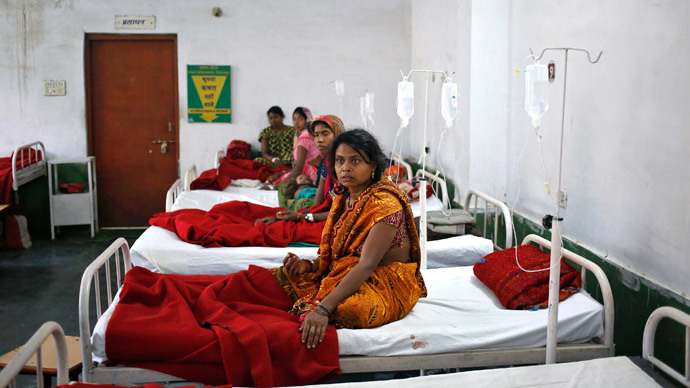Bicycle pumps, reused needles & gloves: Hideous Indian sterilization ops revealed

A probe into the deaths of 13 Indian women as a result of sterilization has revealed that doctors reused the same needles and gloves for all patients. A separate report claimed that medics usually use a bicycle pump for the procedure.
The women died at a state-run camp in the central Indian state of Chhattisgarh last month. Eighty-three women were operated on over the course of six hours at a camp.
The investigation showed that the operations had been conducted in unhygienic conditions. “None of the staff changed their hand gloves in between the procedures. The same injection needle and syringe, and the suture needle were used for all the cases,” a report by four public health organizations said.
“Neither were those sterilized nor new needles taken for each case,” AFP cited it as saying.
Locals initially alleged negligence and claimed the tubectomy
operations were rushed. A single doctor and assistant performed
all of the tubectomies, according to a report in the Indian
Express, citing Bilaspur’s chief medical officer, R.K. Bhange.
Authorities originally attributed the deaths to post-op
medication which reportedly contained traces of a chemical found
in rat poison.
Many of the women who
underwent the sterilizations in Chhattisgarh were paid $23 to
have the surgery, according to the local officials cited by
Reuters. This is a little over a week’s pay for someone living in
poverty in India.
At least 13 died as a result of the procedure, and some 16 were left in a critical condition.
Bicycle pump used as womb inflation device in neighboring state
A photograph emerged of a medical professional wielding the cycle
pump, courtesy of the Hindustan Times. The man allegedly used the
device to inflate the wombs of 56 women after carrying out the
laparoscopic tubectomies, officials said Sunday.
“The doctors should have used an insufflator to pump carbon
dioxide gas into the abdomen of women. The insufflator has an
automatic adjustment of gas pressure and flow performance. It
keeps the process safe,” a senior surgeon of a private
hospital told the Indo-Asian News Service.
One doctor, Mahesh Prasad Rout, is thought to have carried out
the operations Friday in the neighboring eastern Indian state of
Odisha. He told Indian media that in the past 10 years he has
undertaken at least 60,000 operations using the method
Odisha doc uses bicycle pump for sterilisation http://t.co/GAujrcUWtm#ht (Pic: A medical assistant holds the pump) pic.twitter.com/guBMWNHOBQ
— Hindustan Times (@htTweets) December 1, 2014
“Bicycle pumps are used frequently during sterilisation in camps in rural areas that lack sophisticated surgical equipment used for inflating the abdomen,” Rout said. There have been sporadic protests against the employment of bicycle pumps in the region where Rout has been conducting the operations.
“The pipe and nozzle tip of the pump is sterilized before use,” Rout said, in his defense.
The government has reportedly ordered an investigation. Odisha State Health Secretary Arti Ahuja said that a report by inspectors should be filed within a week. “Further action will be taken accordingly,” he told Indian media.
Sterilization surgery is being offered nationwide by the Indian government in an attempt to cut population growth. India is on track to overtake China as the most populous nation on earth by 2050, according to a French study published in October.














